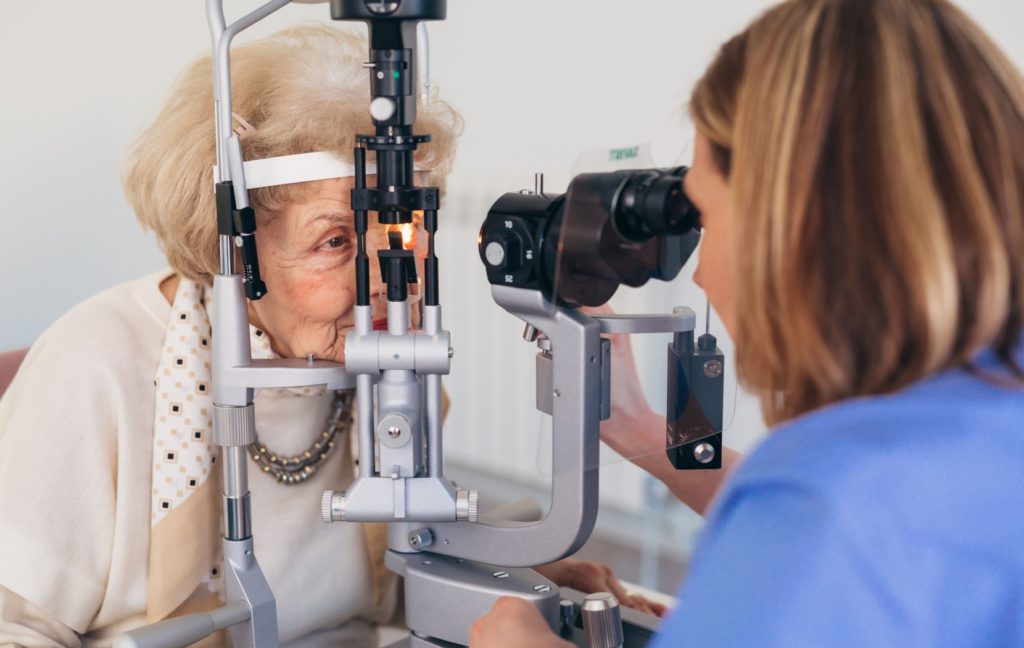If you’ve been noticing changes in your vision, you might be wondering what’s going on and who can help. Macular degeneration is a common concern, especially as we age, but knowing where to seek help can be confusing. Luckily, your optometrist can diagnose and treat macular degeneration.
Macular degeneration can be diagnosed in a routine eye exam, and your optometrist can help you find a custom treatment plan for macular degeneration and many other eye conditions you are experiencing.
What is Macular Degeneration?
Macular degeneration (MD) is an eye disease that affects the macula, a small area in the center of the retina that’s responsible for sharp, central vision. This condition can make everyday activities like reading or recognizing faces difficult. It’s often age-related and is frequently referred to as “age-related macular degeneration”.
There are two main types of MD. Dry MD is more common and causes a gradual loss of vision. Wet MD is less common but more severe. It occurs when abnormal blood vessels grow under the retina, leading to quicker vision loss.
MD doesn’t cause complete blindness but can lead to significant vision impairment. Fortunately, early detection and management can slow its progression. That’s why regular eye exams are crucial, even if you haven’t experienced noticeable vision changes.
Recognizing Early Symptoms
Recognizing the early symptoms of MD can make a significant difference in managing the condition. These symptoms often include:
- blurred vision
- difficulty recognizing faces
- needing more light for reading
- Straight lines appearing wavy
If you notice these symptoms, schedule an eye exam as soon as possible. Early detection is key to slowing the progression of MD and preserving vision.
How Optometrists Can Help
Optometrists are trained healthcare professionals specializing in eye care. They perform eye exams, prescribe corrective lenses, and detect various eye conditions, including macular degeneration. With advanced training and tools, optometrists play a vital role in the early identification and management of MD.
Your optometrist checks for signs of MD during a routine eye exam. They use various tests, like visual acuity tests and retinal imaging, to assess your eye health. Early detection by an optometrist can be the first step in effectively managing the condition.
Many people underestimate the optometrist’s role in diagnosing eye diseases. It’s important to understand that optometrists are often the first line of defense in eye health. Their ability to spot early signs of diseases like MD is crucial in preventing severe vision loss.
Diagnostic Tools and Techniques
Optometrists have a range of tools at their disposal to diagnose MD. One common method is the Amsler grid test, which helps detect changes in central vision. If you see wavy, broken, or blurry lines it might indicate macular issues.
Advanced technology like Optical Coherence Tomography (OCT) provides detailed images of the retina’s layers. This non-invasive test allows optometrists to see any abnormalities in the macula. OCT is useful for diagnosing both dry and wet MD.
Treatment Options for Macular Degeneration
While optometrists can diagnose MD, they also play a role in managing the condition. For dry MD, lifestyle changes such as a diet rich in leafy greens, regular exercise, and quitting smoking can be beneficial. Your optometrist can provide guidance on these lifestyle modifications.
For wet MD, optometrists can coordinate with ophthalmologists if injections or laser treatments are necessary. While they may not perform these treatments, they are essential in monitoring your condition and liaising with specialists.
When to Collaborate with Ophthalmologists
Sometimes your optometrist will refer you to an ophthalmologist, particularly if your MD requires specialized treatment. Ophthalmologists are medical doctors specializing in eye and vision care, capable of performing surgeries.
Your optometrist continues to manage your routine eye care and monitor any changes, while the ophthalmologist handles advanced treatments. This team-based approach provides the best possible outcomes.
In some cases, you may need laser eye surgery to manage your MD. Optometrists cannot do laser eye surgery, and you will need an ophthalmologist to perform the surgery.
The Importance of Regular Eye Exams
Routine eye exams are crucial—especially as we age—for monitoring for changes to the eyes that could indicate MD. These exams are more than just vision checks; they assess the overall ocular health.
An annual eye exam can detect the earliest signs of MD, allowing for timely intervention. Your optometrist will tailor the frequency of these exams based on your age, risk factors, and any symptoms you may have.
Find Custom Treatment Solutions
Macular degeneration doesn’t have to define you. With the expertise of optometrists, early detection, and comprehensive eye care, managing MD becomes a proactive process. Remember, regular eye exams are your strongest ally in preserving vision.
At Total Vision, we offer comprehensive eye exams for adults and seniors so you can stay on top of your eye health. To get started on managing your macular degeneration, you can book an appointment with us today!



